Annapolis, MD; August 7, 2024—The Entomological Society of America congratulates the recipients of its 2024 awards. ESA Awards & Honors recognize scientists, educators, and students who have distinguished themselves through their contributions to entomology. Award honorees will be showcased during Entomology 2024, November 10-13, in Phoenix, Arizona.
Earlier this year, ESA also named the entomologists receiving the following honors:
Professional Awards
Award for Excellence in Integrated Pest Management
This award, which is sponsored by Syngenta Crop Protection, recognizes outstanding contributions that have a direct relation to integrated pest management (IPM).
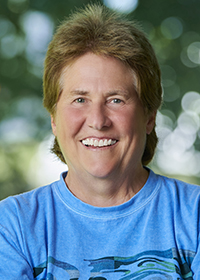 Deborah G. McCullough
Deborah G. McCullough
Michigan State University
Dr. Deborah G. McCullough, a native of Flagstaff, Arizona, holds a B.S. in biology/ecology and a M.S. in forestry from Northern Arizona University, along with a Ph.D. in entomology from the University of Minnesota. She is a professor in the Department of Entomology at Michigan State University with a joint appointment in the Department of Forestry. McCullough balances research, extension, and teaching responsibilities focusing on the ecology, impacts, and management of native and invasive forest insects. She has conducted research on emerald ash borer for more than 20 years, along with studying various other species including jack pine budworm, beech bark disease, and hemlock woolly adelgid. She regularly works with resource managers, regulatory officials, arborists, landowners, and extension educators to develop sustainable management strategies to protect forest and urban forest health. McCullough also assists chestnut growers and Christmas tree producers with insect pest management issues. She currently advises five graduate students, has served as the major advisor for 29 graduate students and four postdocs, and has served on advisory committees for 35 grad students. McCullough teaches a four-credit course on "Forest Insects and Diseases" annually to seniors in forestry and arboriculture and has directed more than 30 undergraduate research or honors projects. She has authored or co-authored more than 135 papers about forest insect ecology and management in scientific journals as well as 240 extension bulletins, websites, videos, or articles in trade publications, and she has given more than 600 presentations on forest insects.
Distinguished Achievement Award in Extension
This annual award recognizes outstanding contributions to extension entomology.
 Elaine Evans
Elaine Evans
University of Minnesota
Dr. Elaine Evans is a University of Minnesota (UMN) extension educator and researcher focused on pollinator conservation. Evans completed both M.S. and Ph.D. degrees in entomology at the University of Minnesota, studying bee diversity in agricultural areas in the Great Plains, competition between honey bees and bumble bees, and tomato and cranberry pollination and bumble bee rearing. Evans has authored several books, including Befriending Bumble Bees: A Guide to Raising Local Bumble Bees and Managing Alternative Pollinators. Evans helped to create the "UMN Pollinator Education Toolkit," which has educated thousands of people about action steps to help pollinators. In 2007, Evans saw the need for surveys focused on declining bumble bees and founded the Minnesota Bumble Bee Survey, using volunteers to survey bumble bees in the Twin Cities area. Since 2016, this survey expanded statewide through the Minnesota Bee Atlas program and in partnership with the Xerces Society Bumble Bee Atlas program. Evans' current work includes participatory science projects to document bumble bee populations and discover bumble bee nests as well as providing training and resources to enhance pollinator education. According to Evans, one of the biggest lessons we have to learn from pollinators is the importance of connection and mutual support.
Distinguished Achievement Award in Teaching
This award is presented annually to the member of the Society deemed to be the most outstanding teacher of the year.
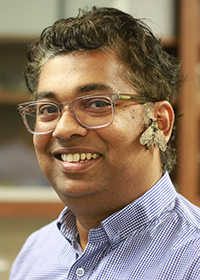 Rupesh Kariyat
Rupesh Kariyat
University of Arkansas
Dr. Rupesh Kariyat received his undergraduate degree in agricultural sciences from Kerala Agricultural University in India. He then went on to earn his M.S. in agronomy (pollination biology focus) from University of Wyoming and his Ph.D. in plant biology with a plant-insect interactions focus from The Pennsylvania State University. After a short postdoctoral stint at Penn State Entomology, Kariyat moved to Swiss Federal Institute of Technology (ETH Zurich) to continue his career as a postdoctoral scholar, and then as a scientist in the Biocommunication and Entomology Group at ETH. In 2017, Kariyat moved to University of Texas Rio Grande Valley as an assistant professor of entomology and was tenured in 2021. In 2022, Kariyat moved to University of Arkansas, Fayetteville, Division of Agriculture, as an associate professor of entomology. Kariyat has graduated 14 M.S. students and currently advises four Ph.D., three M.S., and one Honors student in entomology. Kariyat has been teaching entomology classes since his postdoctoral training at Penn State, and his current classes include "Insect Pest Management," "Insect Behavior and Chemical Ecology," and "Insect Morphology" at graduate and undergraduate levels. Kariyat has published more than 75 peer-reviewed manuscripts and has brought in more than $3.2 million USD in grant funding as a principal investigator/co-principal investigator. The Kariyat Lab at University of Arkansas, Division of Agriculture, is focused on understanding how plants defend against insect herbivores and the mechanisms underlying multitrophic interactions. He has previously received the Distinguished Achievement Award in Teaching from both the Southeastern and Southwestern branches of ESA.
Nan-Yao Su Award for Innovation and Creativity in Entomology
Each year this award is given to an ESA member who is able to demonstrate through his or her projects or accomplishments an ability to identify problems and develop creative, alternative solutions that significantly impact entomology.
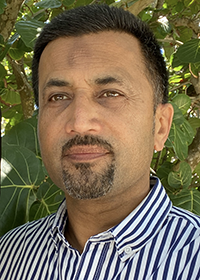 Jawwad Qureshi
Jawwad Qureshi
University of Florida
Dr. Jawwad Qureshi is an associate professor in the Department of Entomology and Nematology and a Research Foundation professor at the University of Florida (UF). He received his M.S. and Ph.D. degrees in entomology from the University of Agriculture, Faisalabad, Pakistan, and Kansas State University, respectively. Qureshi joined UF in 2006. His research and extension program is recognized worldwide for developing environmentally friendly pest management practices in horticultural crops. Qureshi's innovative and creative tools and tactics in entomological research on the Asian citrus psyllid (ACP) vector of citrus greening disease have helped develop sustainable IPM programs for citrus growers.
Qureshi's research on pest monitoring and management in traditional and novel protected citrus production systems resulted in highly significant and long-lasting impacts on ACP suppression and IPM programs for this pest. The "tap" sampling method that he developed became the industry standard. It is an invaluable tool for growers, researchers, consultants, and regulatory agencies requiring a rapid density estimation of ACP populations and its management. Qureshi's research on using broad-spectrum insecticides to target ACP in winter reduces the need for chemical interventions during the growing season, saving the citrus industry millions in spray applications and providing opportunities for the use of selective insecticides and natural enemies. He has published more than 90 refereed research articles and the first book on ACP, a century-old pest devastating the citrus industries in the world, including in the U.S. Qureshi has advised graduate students, postdocs, and research scholars from 15 countries.
Distinguished Achievement Award in the Promotion of Diversity and Inclusion in the Field of Entomology
This award honors a member or member's team for creating and promoting a diverse and welcoming environment for entomologists in their university, place of employment, or community.
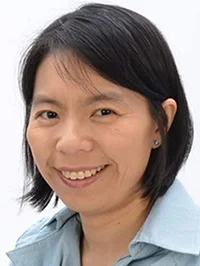 Hongmei Li-Byarlay
Hongmei Li-Byarlay
Central State University
Dr. Hongmei Li-Byarlay is associate professor at Central State University (CSU) and a Fellow of the Royal Entomological Society. Li-Byarlay obtained her Ph.D. in entomology at Purdue University and was an American Association of University Women Postdoctoral Fellow at the University of Illinois-Urbana Champaign. Li-Byarlay's research focuses on the evolutionary genomics, epigenomics, and physiology underlying the social behavior of honeybees and pollinators, bee genetics and breeding, and landscape ecology of bee pollinators. Her research is supported by USDA NIFA and NSF. She has published more than 50 peer-reviewed scientific publications in Proceedings of the National Academy of Science, Science of Total Environment, and BMC Genomics. Working at a Historically Black College and University and an 1890 Land Grant Institution, Li-Byarlay provided research, teaching, and extension opportunities and an equal and inclusive working environment for many under-represented minority students, first-generation college students, and the broader population within and beyond Ohio. Li-Byarlay designed and taught new courses for undergraduate students in fundamental topics of entomology. Li-Byarlay is currently the project director for the USDA NEXTGEN program at CSU for training future leaders in agriculture. She served in leadership positions in ESA as president of the International Branch of ESA and past chair of the ESA Diversity and Inclusion Committee. Li-Byarlay received the Zenith Award from the Association for Women in Science in 2023 and the Presidential Faculty Excellence Award for Teaching, Research, and Service at CSU in 2023.
Science Communication Award
This award honors impactful and innovative communication projects or programs that engage diverse public audiences with entomology-related scientific information.
- (1st Place) Edible Insects MOOC, Matan Shelomi, National Taiwan University
- (Runner-Up) Expedition Entomology, Jace Porter, Global Entomology Coalition
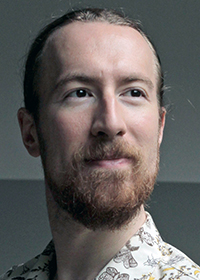 Edible Insects MOOC
Edible Insects MOOC
Matan Shelomi, National Taiwan University
Dr. Matan Shelomi is an associate professor of entomology at National Taiwan University (NTU) in Taipei, Taiwan. Born in New York City, he received his Ph.D. from the University of California, Davis, and was a postdoctoral fellow at the Max Planck Institute for Chemical Ecology in Jena, Germany, before immigrating to Taiwan. His research emphasis is on insect-microbe interactions in the digestive tracts of herbivorous insects such as stick insects and rhinoceros beetles.
In 2018, Shelomi created a liberal arts course, "Edible Insects," aimed at nonmajors and taught in English. It was a smashing success, rapidly becoming the most popular course offered by the Entomology Department, with its registration regularly filling up within seconds. Even when offered every semester, an in-person university class can only reach so many people, from a very small pool, at a cost. To make his material available for the entire world for free, Shelomi produced a massive open online course (MOOC) on edible insects, released in 2023 on Coursera (https://www.coursera.org/learn/edible-insects). It is the second-ever entomology course on Coursera and the first-ever MOOC on edible insects on any platform. Shelomi is the sole instructor, and the course was created together with the NTU Center for Teaching and Learning Development and the NTU Digital Learning Center. Translated into multiple languages, the MOOC has reached students from Mexico to India, the majority of whom are not college students.
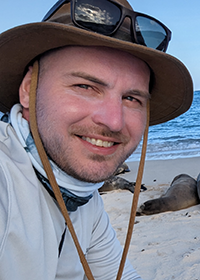 Expedition Entomology
Expedition Entomology
Jace Porter, Global Entomology Coalition
Jace Porter's passion for entomology and conservation led to a creative approach to entomological science communication. Previous experience as a research and collection technician with the University of New Hampshire, combined with the passion he gained for informal education as a former educator with The Caterpillar Lab, has allowed him to find unique ways to engage with a diverse range of audiences. Porter currently owns the New England Insectarium, a traveling live insect exhibit dedicated to making these animals approachable to everyone. He particularly enjoys "guerilla" education—bringing charismatic native insects to public spaces to engage with passersby.
Opening a new avenue for international outreach, connection, and collaboration, Porter founded the Global Entomology Coalition (GEC), an organization dedicated to creating a shift in public perception of insects and propelling entomological research forward. Funding shortages leading to a subsequent lack of entomological data being incorporated into environmental studies has led to the creation of one of its primary initiatives: Expedition Entomology. Expedition Entomology is a collaboration between field stations around the world and GEC to organize open research expeditions conducted by adventurous travelers and citizen scientists, regardless of academic background or affiliation, to foster a deeper bond between human and insect via true exploratory travel experiences while providing assistance in field work and equipment donations, and generating no-strings-attached funding for field stations, research projects, grants, scholarships, innovations, education, and conservation initiatives. This not only adds entomological data layers to existing projects, but crafts new and meaningful research to bring focus to the importance of entomological research.
ESA Certification Corporation Awards
ACE Professional Award
This award recognizes superior contributions of an Associate Certified Entomologist in the field of structural pest management.
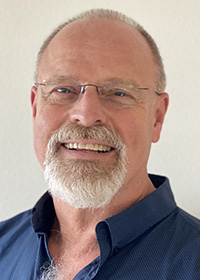 Kurt Treftz
Kurt Treftz
Cascade Pest Control
Kurt Treftz, ACE, is director of Cascade Pest Control, which he co-founded in 1979. Over the years, he has served as president of the Washington State Pest Management Association and later chaired the Ethics and the Environmental Awareness Committees. An early adopter of IPM practices, Treftz led Cascade Pest Control to earning various environmental awards in Washington State, such as an award from the Washington State Ecological Commission, the Governor's Environmental Award, and the Evergreen Award from EPA's Region 10. Treftz also served on the Washington State IPM in Schools Committee.
Treftz adopted an all-in approach toward ESA's CIT and ACE certification for all Cascade Pest Control licensed PMPs. As a result, 65% of Cascade technicians hold ESA certifications, with six Certified IPM Technicians and seven Associate Certified Entomologists.
Treftz also initiated the Dr. Laurel Hansen Scholarship with Washington State University and garnered industry support. As a result, many PMPs have further contributed, making it an endowed scholarship.
Early Career Professional (ECP) Awards
Henry and Sylvia Richardson Research Grant
This grant provides research funds to postdoctoral ESA members who have at least one year of promising work experience, are undertaking research in selected areas, and have demonstrated a high level of scholarship.
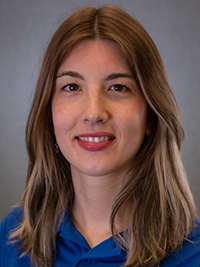 Emilie Demard
Emilie Demard
University of Florida
Dr. Emilie Demard is a postdoctoral researcher at the University of Florida under the guidance of Dr. Lauren Diepenbrock. She completed a M.S. in agronomy with a minor in crop protection and plant breeding at AgroSup Dijon, France. She obtained her Ph.D. in entomology from the University of Florida under the supervision of Dr. Jawwad Qureshi. During her doctoral program, Demard studied the management of pest mites in Citrus Under Protective Screen (CUPS). Her research work encompasses integrated pest management, biological control, insect behavior, and acarology. Her overall research goal is to better understand the biology and ecology of arthropod pests to provide sustainable and effective management tactics to growers.
In her current position, Demard investigates the feeding behavior of two major insect pests using a technology called electropenetrography. She also studies the efficacy of insecticides to control key pests of citrus in Florida. To raise awareness about the importance of insects in our ecosystems, Demard has volunteered at more than 20 outreach events, such as science state fairs, summer camps, master gardener programs, and 4H programs.
Demard currently serves as a member-at-large of the Southeastern Branch and a member of the governing board of the Acarological Society of America. She participated in the 2024 ESA Professional Advancement Career Training Program. She is also a member of the Postdoctoral Affairs Advisory Committee at the University of Florida.
Early Career Innovation Award
This award honors young professionals working within the field of entomology who have demonstrated innovation through contributions within any area of specialization (research, teaching, extension, product development, public service, etc.).
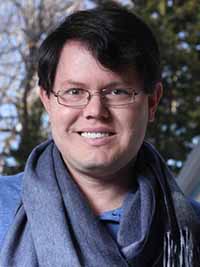 Rob Morrison
Rob Morrison
USDA-ARS Center for Grain and Animal Health Research
Dr. Rob Morrison is currently a research entomologist for the USDA-ARS Center for Grain and Animal Health Reseaarch in Manhattan, Kansas, where his current research program involves elucidating the behavioral ecology and chemical ecology, and improving the IPM, of stored product insects. He has served in this position for eight years and manages a lab staff of 14, including three co-advised Ph.D. students, one M.S. student, and four postdocs. The overarching goal of his research program is to develop behaviorally based management programs for insects after harvest. Other recent significant work includes studying the application of long-lasting insecticide netting to food facilities.
Morrison graduated with his B.A. in biology from Kalamazoo College in Michigan in 2006 and his M.S. in ecology and evolution from the University of Munich in Germany in 2009. In 2014, Morrison received his Ph.D. from the Department of Entomology at Michigan State University, researching the behavioral ecology and IPM of the asparagus miner. From 2014 to 2016, Morrison was a postdoctoral researcher at the USDA-ARS Appalachian Fruit Research Station, where he helped lay the foundation for an attract-and-kill program for the brown marmorated stink bug in apple orchards.
He has published 110+ peer-reviewed publications and obtained more than $13 million in extramural funding, and he and his students have given more than 300 presentations, both nationally and internationally. He serves ESA through his involvement as chair of the Awards & Honors Committee, subject editor for Environmental Entomology, and Governing Board representative on the P-IE Governing Council.
ECP Extension, Outreach, and Engagement Award
This award honors a student transition or early professional working within the field of entomology who has demonstrated excellence, leadership, and creativity in extension, outreach and public engagement.
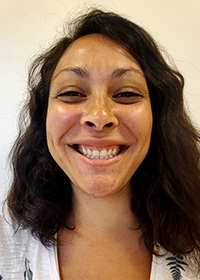 Michelle Boone
Michelle Boone
National Park Service
Dr. Michelle Boone contracts with the National Park Service as a pollinator project manager in the Inventory and Monitoring Division, where she oversees bee and butterfly inventory projects at 28 park units. She previously served as a postdoctoral research associate at Washington State University Vancouver, studying the effects of microhabitat characteristics on western monarch growth and survival. She earned an A.A. (liberal arts) at North Hennepin Community College, B.Sc. (biology) at the University of St. Thomas, and Ph.D. (entomology) at the University of Minnesota. Her doctoral research explored factors that impact detection and occupancy probabilities of imperiled bumble bees.
Boone has volunteered extensively in public outreach and education in Minnesota, Oregon, and Washington. She is an active volunteer in the Xerces Society Ambassador Program, which mobilizes volunteers to engage in public outreach and education on invertebrate conservation. Since joining the program in 2022, Boone has engaged with nearly 3,000 people of all ages at various public events. As a woman of color and first-generation college student, Boone understands the unique barriers that prevent members of underserved communities from entering and persevering in STEM fields, which drives her commitment to public outreach. She has also volunteered with the Minnesota Master Naturalist Program, People of Color Outdoors Guardians Program (a youth summer program that engages marginalized students with nature), Frenatae (University of Minnesota graduate student organization), and more. Boone was previously awarded the Mary A. McEvoy Public Engagement and Leadership Award from the University of Minnesota in 2020.
ECP Research Award
This award recognizes a student transition or early professional who has made outstanding research contributions to the field of entomology.
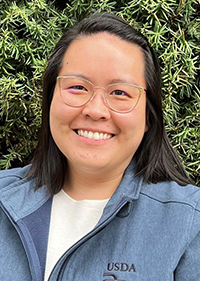 Karen Poh
Karen Poh
USDA-ARS
Dr. Karen Poh is a research entomologist in the USDA-ARS Animal Disease Research Unit in Pullman, Washington. Using a One Health approach, she investigates ecological relationships ticks have with their hosts and the environment and the influence of human behavior on the success of vector-borne disease prevention and education implementation efforts.
Poh has a background in public health, earning a B.S. in public health and a master's degree in public health in environmental and occupational health sciences. It was through her public health courses that she gained an interest in vector-borne diseases, which then inspired her to complete a Ph.D. in entomology at Texas A&M University. She then completed a postdoc position in the Veterinary Entomology Laboratory at The Pennsylvania State University, where she conducted research on ticks, tick-borne diseases, and tick bite prevention in Pennsylvania.
Combining her interests in public health and vector-borne diseases, Poh now leads several projects in the USDA, with topics focusing on tick ecology and behavior, vector competency, and predictive modeling to develop prevention and control strategies that protect people and their animals from domestic and exotic ticks and tick-borne disease threats. She has been recognized for her research, receiving accolades such as the 2024 USDA-ARS Pacific West Area Early Career Research Scientist Award and 2023 Excellence in Early Career Awards for the Eastern Branch and Pacific Branch of ESA. Poh has been involved with ESA since 2017 and has served several leadership roles in the Society, including serving as the MUVE ECP representative and 2024 program co-chair.
ECP Teaching and Mentoring Award
This award is given to a student transition or early professional who excels in entomological education and/or mentoring. This award recognizes their dedication to fostering the next generation of entomologists.
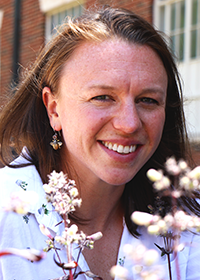 Sarah Elzay
Sarah Elzay
Fort Hays State University
Dr. Sarah Elzay is an assistant professor in the Department of Biological Sciences at Fort Hays State University. She joined the department in 2022, and her lab focuses on native pollinators and landscape ecology. Elzay received her B.A. from Johns Hopkins University, her M.S. from the University of Wyoming, and her Ph.D. from Oklahoma State University. She served as a postdoctoral researcher for Dr. Kristen Baum at Oklahoma State University.
At Fort Hays State University, Elzay teaches a range of courses in biology, ecology, and management. Her primary focus is to ensure that students can learn biology, ecology, and management concepts via experiential learning, including prescribed burns, woody encroachment management, forensic entomology, and necropsies. Such hands-on experiences give students the opportunity to discover the joys and challenges of field biology and ecology. Whenever possible, Elzay incorporates insects as models. She is also committed to increasing the accessibility of biology, ecology, and management courses by creating online curricula. She strives to create compelling online laboratory courses that immerse students in the scientific process, even in a digital space.
A member of ESA since 2019, Elzay has served on several section, branch, and national committees within ESA, including the Student Activities Committee and the NCB Early Career Professionals Committee.
Student Awards
Alate Award
This grant honors students currently enrolled at Historically Black Colleges and Universities (HBCUs) and other Minority-Serving Institutions (MSI), to promote interest in entomology and to stimulate interest in attending the ESA Annual Meeting.
- Jonathan Hernandez, Texas A&M University
- Emily Medelez, University of Texas Rio Grande Valley
- Elizabeth Taylor, Northern Illinois University
- Grant Wass, Palomar College
- Sakshi Watts, University of California, Riverside
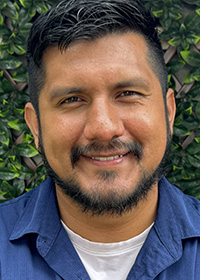 Jonathan Hernandez
Jonathan Hernandez
Texas A&M University
Jonathan Hernandez is a Ph.D. candidate at Texas A&M University's Department of Entomology, under the mentorship of Dr. Patricia V. Pietrantonio. His research focuses on assessing insecticide resistance in Aedes aegypti by investigating the efficacy of pyrethroid adulticides for controlling this mosquito species.
Hernandez's academic journey began with a B.S. in biology from Texas A&M University-San Antonio, where he graduated magna cum laude. His early research experience included vector mosquito surveillance and investigating nanostructured materials at Iowa State University. Postgraduation, he worked as a research technician at the Southwest Research Institute, where he developed skills in microencapsulation techniques.
During his Ph.D., he has published significant findings on insecticide resistance in Aedes aegypti in PLOS NTDs. His studies revealed the presence of kdr mutations in the mosquito populations in Texas, affecting their survival after insecticide application. His ongoing research aims to correlate genotypic insecticide resistance with field mortality, enhancing the understanding of resistance dynamics and improving vector control strategies. Additionally, Hernandez has extended his knowledge to the physiology of ticks.
Hernandez has also contributed to the academic community through teaching assistantships, mentoring students, and participating in numerous conferences and competitions. He is a recipient of several awards, including the Entomological Society of America's Alate Travel Award.
As a first-generation Latino student, Hernandez balances his academic pursuits with family responsibilities. He aims to pursue a career in academia or industry, focusing on the development and testing of novel insecticides.
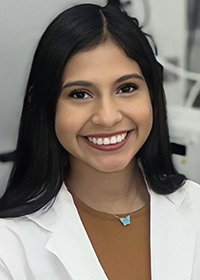 Emily Medelez
Emily Medelez
University of Texas Rio Grande Valley
Emily Medelez is a graduate student researcher and a teaching assistant at the University of Texas Rio Grande Valley, where she obtained her bachelor's degree in biological sciences with a minor in sociology. She is currently a second-year graduate student in biology.
In the fall of 2022, she began her work at the Weed Ecology Lab and the Center of Vector-Borne Disease Lab under the mentorship of Dr. Pushpa Soti and Dr. Christopher Vitek. Her research explores the influence of invasive plants on mosquito behavior. The findings from this research could contribute valuable data to support control measures aimed at mitigating the transmission of vector-borne diseases. She presented her work at the American Mosquito Control Association; the National and Regional Conferences of Minorities in Agriculture, Natural Resources, and Related Sciences; and the College of Science Annual Research Conference at the University of Texas Rio Grande Valley, where she was recently awarded Best Graduate Oral Presentation and several other scholarships.
In addition, Medelez has experience in teaching, leading youth organizations, and mentoring multiple students throughout her academic career. She intends to complete her Ph.D., after which she aims to pursue a career in entomology or with the Centers for Disease Control and Prevention utilizing her experience in insect vector research. She is honored to receive this award and is deeply grateful to her graduate committee, Dr. Soti, Dr. Vitek, Dr. Sarah Maestas, and the Entomological Society of America for this opportunity and recognition.
 Elizabeth Taylor
Elizabeth Taylor
Northern Illinois University
Elizabeth Taylor is a Ph.D. candidate at Northern Illinois University (NIU) researching alternative methods for the control of house flies. Taylor is originally from Oregon and moved to Illinois to complete her bachelor of biological sciences degree at Illinois State University. Taylor went on to complete a master of biological sciences with an ecology, evolution, behavior, and conservation focus at NIU, researching potential environmental dietary resources for the parasitoid wasp Spalangia cameroni.
As part of her research into alternative methods for the control of house flies, Taylor has examined the alternative sweeteners allulose and neotame as non-nutritive replacement phagostimulants in toxic baits, the effect of adding an eicosanoid biosynthesis inhibitor to a fungal biopesticide, and the impact of buckwheat on rates of parasitism and parasitoid diversity on a cattle facility.
During her time at NIU, Taylor has mentored six undergraduate students and two graduate students. She has also served an integral role in the implementation of the Fly-CURE, a course-based undergraduate research experience characterizing and mapping growth mutations in Drosophila melanogaster. She has also served on DEI committees on the department and college levels. Taylor has volunteered at several events, explaining both biological and entomological concepts to elementary, middle, and high school students.
 Grant Wass
Grant Wass
Palomar College
Grant Wass is a third-year student at Palomar College pursuing an associate's degree in biology with interests in invertebrate evolution and biogeography. After graduating, he plans to transfer to a four-year university to continue his studies in evolutionary biology to broaden his skills and knowledge in evolution and ecology.
Currently, he is conducting research on the biogeography of North American schizomids (short-tailed whip scorpions) in the Hedin Lab at San Diego State University and working to discover seasonal preferences and behavioral patterns of cotton seed bug (CSB), or Oxycarenus hyalinipennis, with the Hoddle Lab at University of California, Riverside. By employing data from DNA sequences and fossils to generate time estimates and predict the range evolution of North American schizomids, Wass seeks to better understand how schizomids spread across the North America.
Likewise, on Palomar College's San Marcos campus, Wass is conducting a two-year survey monitoring several factors regarding the CSB's life cycle and impact on host plants.
Previously, Wass worked under the Giribet Lab at Harvard University as an REU intern to unravel the genetic diversity of South American harvesters (Opiliones) and surveyed native bee diversity at Cabrillo National Monument under the National Park Service. He is also the president and founder of the Palomar Wildlife Club, where he has led many youth education initiatives, habitat cleanups, and other wildlife outreach events.
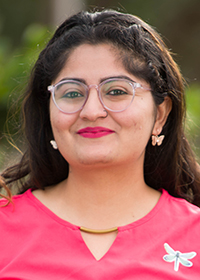 Sakshi Watts
Sakshi Watts
University of California, Riverside
Sakshi Watts is a Ph.D. candidate in entomology at the Center for Integrative Bee Research at the University of California, Riverside (UCR). Her research, supervised by Dr. Boris Baer, focuses on the comparative growth, resilience, and social immunity of survivor (feral) and commercial honey bees (Apis mellifera L.) in response to abiotic and biotic stressors. Watts' work aims to address the significant challenges faced by the beekeeping industry due to dramatic losses in commercial honey bee populations, which impact food security and biodiversity. By studying the performance and resilience of both survivor and commercial bees, her research provides crucial insights into improving bee health management practices.
Watts has an impressive academic background, holding a master's degree in biology from the University of Texas Rio Grande Valley, where she investigated plant-insect interactions. Her dedication to entomological research has earned her numerous awards, including the Science of Sustainability Fellowship by UCR and first place in the Ph.D. 10-Minute Paper Competition at the ESA Pacific Branch Meeting.
In addition to her research, Watts is actively involved in outreach and mentoring, serving as a mentor and guide to many undergraduate and graduate domestic and international students. She has presented her findings at various conferences and seminars, contributing significantly to the field of entomology.
As a first-generation international graduate student, Watts is committed to advancing scientific knowledge and promoting diversity in academia. Her work has the potential to make a lasting impact on honey bee health management and the broader agricultural industry.
The Larry Larson Graduate Student Award for Leadership in Applied Entomology
This ESA award, sponsored by Corteva, recognizes Dr. Larry Larson's role as a leader and pioneer in insect management and carries that legacy to the next generation of leaders in applied entomology.
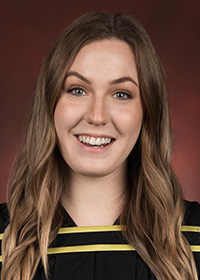 Stéphanie Gagnon
Stéphanie Gagnon
McGill University
Stéphanie Gagnon is a Ph.D. student in entomology at McGill University in the Department of Natural Resource Sciences. Gagnon is interested in community ecology and plant-insect interactions. She is currently studying plant-pollinator relationships on floral strips surrounding cranberry farms in the Centre-du-Québec region. Her research aims to create an interaction network to uncover which wild pollinators and wildflowers occur in these disturbed systems and understand their mutual associations. This information will guide farmers in selecting the appropriate flowers to plant along the edges of their farms to promote pollination services, thus contributing to the enhancement of green spaces in agroecosystems. This year, Gagnon has published her first peer-reviewed article in ESA's journal, Insect Systematics and Diversity.
Gagnon is also deeply committed to teaching and community outreach. She delivered a course on evolution at McGill last semester and gave a prestigious TEDx talk on women in STEM and mental health in academia. Moreover, she is a member of ESA's Diversity, Equity, and Inclusion Committee, working to highlight the achievements of brilliant scientists from marginalized groups.
At the Lyman Entomological Museum, where she conducts research, Gagnon holds several leadership positions. She serves as the team leader for fieldwork conducted on cranberry fields and mentors multiple undergraduate students undertaking internships or honors' projects at the museum. As the first member of her family to attend a university, Gagnon is honored to receive this award, which will inspire her to continue on her path to success.
Lillian and Alex Feir Graduate Student Travel Award in Insect Physiology, Biochemistry, or Molecular Biology
The purpose of this ESA award is to encourage graduate students working with insects or other arthropods in the broad areas of physiology, biochemistry, and molecular biology to affiliate with ESA's Integrative Physiological and Molecular Insect Systems Section and to attend the ESA Annual Meeting.
 Gagandeep Brar
Gagandeep Brar
Bayer Crop Science
Gagandeep Brar is an entomologist at Bayer Crop Science, where he oversees discovery and next-generation trait testing field trials for several Lepidopteran and Hemipteran pests in cotton, corn, and soybean. Additionally, he provides genomics and transcriptomics insights to study the species distribution of different Lepidopteran species using molecular biology and bioinformatics skills. Brar recently completed his doctoral research at North Dakota State University, focusing on the gut microbial ecology of overwintering honey bees; the interplay between ecology, nutrition, and the microbiome of the alfalfa leafcutter bee; and the cold physiology (diapause) transcriptomics of the alfalfa leafcutter bee. During his M.S. program, he developed proficiency in various molecular techniques by conducting lab and greenhouse insect bioassays, specifically focusing on feeding gene-specific dsRNA in whiteflies and bean beetles. Armed with extensive knowledge in crop protection, agronomy, molecular biology, and bioinformatics, Brar aims to advance pest control strategies and promote pollinator health, supporting the sustainability of our agro-ecosystem. His passion for entomology is driven by his genuine interest in engaging with farmers and learning from their experiences in agriculture. This fuels his curiosity and commitment to the field. He is also motivated by the prospect of pushing boundaries in scientific exploration, bridging the gap between laboratory research and real-world field applications to foster innovative solutions and contribute to advancements in entomological science.
Student Activity Award
Sponsored by Bayer, this award will be presented annually to recognize a student for outstanding contributions to the Society, their academic department, and the community, while still achieving academic excellence.
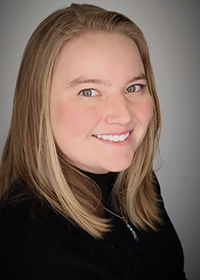 Victoria Pickens
Victoria Pickens
Kansas State University
Victoria Pickens, originally from Sand Springs, Oklahoma, received her B.S. in entomology at Oklahoma State University in 2019. Currently, she is a Ph.D. candidate in the Department of Entomology at Kansas State University (KSU) co-advised by Dr. Dana Nayduch (USDA-ARS) and Dr. Cassandra Olds (KSU). Her research investigates the role of house flies in the carriage of antimicrobial-resistant bacteria at Kansas confined cattle operations. With a strong interest in One Health, Pickens additionally aids in research on horn flies, mosquitoes, ticks, and other arthropods affecting human and animal health.
She has held numerous leadership roles throughout her graduate program, most notably ESA Student Affairs Committee chair and MUVE representative, secretary to the S1076 Multistate Research Project Group, and three years as co-coordinator of the Kansas FFA Entomology Career Development Event (CDE). Her contributions to ESA include co-organization of 11 symposia and workshops, coordinating student activities, serving multiple years as an award judge, and volunteering on the Education and Outreach and FIT Pilot Section SOP Development Committees. Passionate about extension and outreach, Pickens actively supports her department and the public through volunteering, attending stakeholder meetings, co-organizing workshops and activities, mentoring students, co-developing extension webpages and materials, and serving on departmental committees. Additionally, she has helped redesign and create departmental programs, such as the FFA Entomology CDE and Virtual Outreach Program, improving K-12 student and teacher engagement in entomology across Kansas and the nation. Pickens aspires to continue assisting the public, particularly with pests of human and animal health importance.
John Henry Comstock Award
These six awards are given to one graduate student from each ESA Branch to promote interest in entomology and to stimulate interest in attending the ESA Annual Meeting.
- Alice Assmar, McGill University (International Branch)
- Ethan Doherty, Clemson University (Southeastern Branch)
- Dane Elmquist, University of Wisconsin-Madison Award (Pacific Branch)
- Lidia Komondy, Cornell University (Eastern Branch)
- Hailey Shanovich, U.S. Geological Survey (North Central Branch)
- Jordan Twombly Ellis, Texas A&M University (Southwestern Branch)
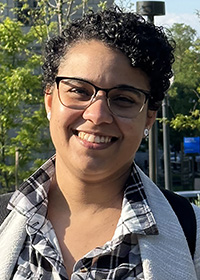 Alice Assmar
Alice Assmar
McGill University
Alice Assmar is a Ph.D. candidate at McGill University, working under the mentorship of Dr. Jessica Gillung and co-supervised by Dr. Renato Machado from the Federal University of Paraná. She received her M.S. degree in animal diversity from Federal University of Bahia in 2019, where she reviewed the taxonomy of a freshwater insect group and estimated its phylogenetic history. Her doctoral research focuses on understanding the mechanisms behind life-strategy transitions in freshwater insects. Additionally, she is investigating the processes leading to their diversification and distribution on Earth through time. Assmar's research will be the first to provide an evolutionary history hypothesis for the Osmyloidea (Neuroptera) superfamily.
Assmar's general research interests and experience include museum curation, phylogenetics, evolution, taxonomy, and biogeography of insects, particularly those in freshwater habitats. She has described new species of spongillaflies and contributed to the understanding of their morphological characters, and she is now building a global distributional database for the group. Assmar has a growing passion for using bioinformatics, museomics, and genomics to answer natural history questions. Throughout her academic path, she has been awarded numerous research and travel grants, fellowships, and scholarships, displaying her dedication to securing funds for scientific and professional advancement. Outside of academia, Assmar enjoys traveling, playing guitar, drawing, watching series, and spending time with her wife and friends.
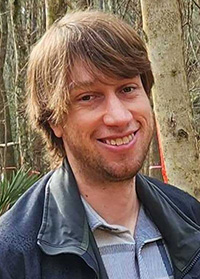 Ethan Doherty
Ethan Doherty
Clemson University
Dr. Ethan Doherty is a postdoctoral fellow at Clemson University, split between the Department of Mathematical and Statistical Sciences and the Department of Forestry and Environmental Conservation. Collaborating with the USDA-APHIS on a multi-institutional project, he is modeling the spread of invasive Asian longhorned beetles throughout the U.S. Doherty received his Ph.D. from Louisiana State University (LSU) in 2023, supervised by Dr. Blake Wilson and Dr. Qian (Karen) Sun. His dissertation took an interdisciplinary approach toward stored rice pest management by exploring pest behavior, chemical ecology, biological control, hostplant resistance, and chemical control. During his Ph.D., he served as president of the LSU Entomology Student Association. Previously, he had received a M.S. in entomology and nematology from the University of Florida, where he also served as the fundraising chair of the student organization. While originally from Chapel Hill, North Carolina, he earned his B.A. in biology from The College of Wooster in Ohio. His diverse research background has allowed him to work in a variety of fields, from entomology to primatology to microbiology. Outside the office, he enjoys a few creative pursuits, including music composition, writing, game design, and digital illustration.
 Dane Elmquist
Dane Elmquist
University of Wisconsin-Madison
Dr. Dane Elmquist obtained his Ph.D. from the University of Idaho in December 2023. Dr. Sanford Eigenbrode was his advisor. He received his B.S. in ecology from the University of Minnesota and his M.S. in entomology from Washington State University. Elmquist's doctoral research focused on understanding how agricultural diversification practices influence soil arthropod communities' biodiversity and ecosystem functioning. His extension and outreach focused on increasing producer and public awareness about the incredible world of soil arthropods and how these often-overlooked organisms contribute to soil health and agroecosystem sustainability. Elmquist received a USDA NIFA predoctoral fellowship and a Western SARE graduate student grant during his doctoral program. He also received the Outstanding Graduate Student Award from the University of Idaho (2023). Elmquist has received the President's Prize in several student TMP and poster competitions at PBESA and ESA. He has been an ESA member since 2015 and served as the PBESA representative to the ESA Entomology Games Committee (2020-2022). During his doctoral program, Elmquist was the treasurer and vice president of the University of Idaho's Aldrich Entomology Club. He now works as an extension outreach specialist in the Crop and Soils Program at the University of Wisconsin-Madison.
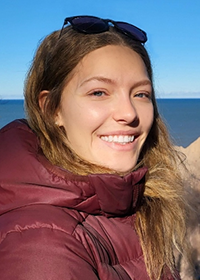 Lidia Komondy
Lidia Komondy
Cornell University
Lidia Komondy is a Ph.D. candidate and Foundation for Food and Agricultural Research Fellow in the Department of Entomology at Cornell University, where she is advised by Dr. Brian Nault. She obtained her B.S. in entomology from Michigan State University in 2018 and went on to obtain her M.S. in entomology from the University of Florida in 2020. At Cornell, Komondy's research integrates the ecology and management of plant-pathogenic arthropods within specialty cropping systems to provide the most economically and ecologically sustainable management decisions. Specifically, her research aims to understand the mechanisms that drive spatial and temporal patterns of pest dispersal and the epidemiology of viral pathogens in specialty cropping systems using precision agricultural tools. She will be graduating in May 2024 and has accepted a position as a precision ag operations manager for the State of Michigan with Precision.Ag and Waypoint Analytical. Beyond her research, Komondy is invested in scientific communication through outreach and extension activities, and is committed to serving in roles that "bridge the gap" between scientists and the public.
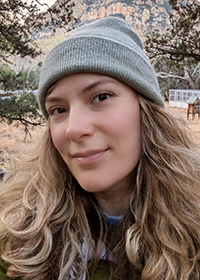 Hailey Shanovich
Hailey Shanovich
U.S. Geological Survey
Dr. Hailey Shanovich (she/they) is a postdoctoral fellow with the U.S. Geological Survey Southeast Climate Adaptation Science Centers performing translational science and assisting with policy on climate change and its impacts on wildlife management and conservation. Currently, their research pertains to the climate change vulnerability of pollinators in the Southeast U.S. Shanovich is currently a member-at-large for the Common Names Committee and Better Common Names Task Force, and just wrapped up serving as the previous student representative to the P-IE Section Governing Council. Shanovich cares deeply about the accessibility and inclusivity of science and effective communication in STEM.
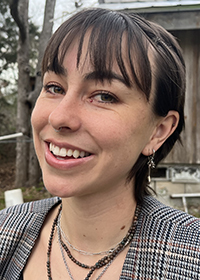 Jordan Twombly Ellis
Jordan Twombly Ellis
Texas A&M University
Jordan Twombly Ellis is a fifth-year Ph.D. candidate in Dr. Juliana Rangel's honey bee lab, where she studies the cause and mechanism of a novel premature hive exiting behavior of honey bees. Twombly Ellis received her undergraduate degree from Cornell University in insect biology, where she conducted her thesis research on how Varroa mites affect honey bee development and behavior. She was awarded the Graduate Diversity Excellence Fellowship to continue her studies at Texas A&M University. Twombly Ellis has served on the ESA Student Affairs Committee at both the branch and national level. She has received funding for her research from beekeeping organizations such as the Eastern Apicultural Society, American Beekeeping Federation, and the North American Pollinator Protection Campaign. Twombly Ellis received the USDA-NIFA Predoctoral Fellowship to continue to research premature hive exiting behavior on a colony level and will be graduating this December.
###
CONTACT: Joe Rominiecki, jrominiecki@entsoc.org, 301-731-4535 x3009
ABOUT: ESA is the largest organization in the world serving the professional and scientific needs of entomologists and people in related disciplines. Founded in 1889, ESA today has nearly 7,000 members affiliated with educational institutions, health agencies, private industry, and government. Headquartered in Annapolis, Maryland, the Society stands ready as a non-partisan scientific and educational resource for all insect-related topics. For more information, visit www.entsoc.org.
